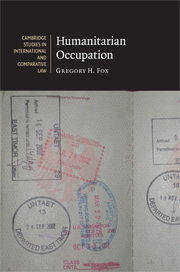Book contents
- Frontmatter
- Contents
- Acknowledgments
- Introduction
- Section I Historical antecedents
- 1 The historical origins of humanitarian occupation I: governance in service of outsiders
- 2 Historical origins of humanitarian occupation II: internationalized territory in service of insiders
- 3 Full international governance
- Section II Why humanitarian occupation?
- Section III Legal justifications
- Conclusions
- Index
- CAMBRIDGE STUDIES IN INTERNATIONAL AND COMPARATIVE LAW
3 - Full international governance
Published online by Cambridge University Press: 02 February 2010
- Frontmatter
- Contents
- Acknowledgments
- Introduction
- Section I Historical antecedents
- 1 The historical origins of humanitarian occupation I: governance in service of outsiders
- 2 Historical origins of humanitarian occupation II: internationalized territory in service of insiders
- 3 Full international governance
- Section II Why humanitarian occupation?
- Section III Legal justifications
- Conclusions
- Index
- CAMBRIDGE STUDIES IN INTERNATIONAL AND COMPARATIVE LAW
Summary
When the United Nations began authorizing post-conflict reconstruction missions in the 1990s, it entered unfamiliar territory. The organization had become involved in shaping the political, economic and social priorities of its member states. The question of how nations are governed had moved beyond the social contract between state and citizen and become a question for the broader international community. To extend the metaphor, one might say the international community was not only dictating the terms of the social contract, but had become, in a very real sense, its guarantor. Many of the post-conflict reconstruction missions reviewed in the last chapter originated in agreements among multiple international actors. Each had a defined role in supervising the process of reform, tasks that could not be left to national political factions still mistrustful of each others' motives and only moderately committed (at best) to the goal of inclusive national politics. Outsiders, in other words, both designed states' domestic institutions and policed any deviations from those designs. In describing these first efforts of the 1990s, the Secretary-General sought to place the UN's work in a familiar setting, linking the missions to widely-accepted goals such as conflict prevention. But the internationalization of national politics was undeniably new, whatever its arguable connection to traditional Charter values.
This chapter examines the outer parameters of this new undertaking by exploring the four most intrusive examples of international administration to date: Bosnia, Kosovo, East Timor and Eastern Slavonia. In each case, the target state was divested of governmental functions over some or all of its territory.
- Type
- Chapter
- Information
- Humanitarian Occupation , pp. 72 - 112Publisher: Cambridge University PressPrint publication year: 2008



